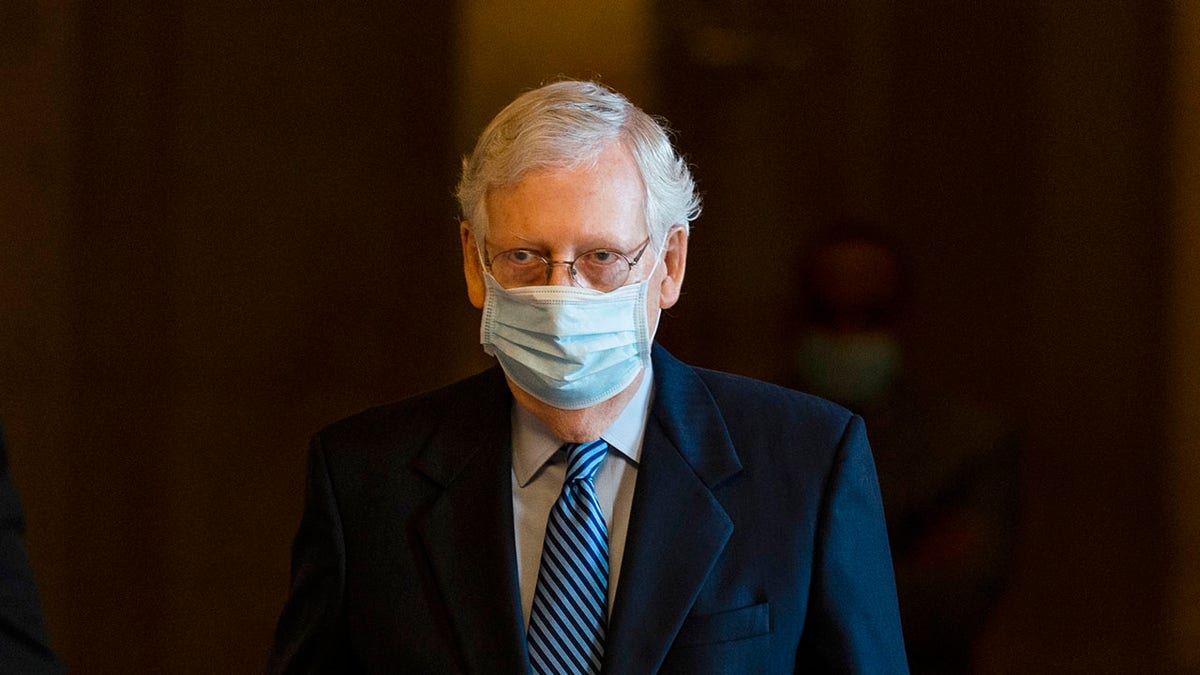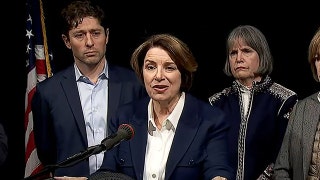Fox News Flash top headlines for December 21
Fox News Flash top headlines are here. Check out what's clicking on Foxnews.com.
Senate Majority Leader Mitch McConnell, R-Ky., wasn’t the first person in the Senate last week to formally recognize President-elect Joe Biden as the 46th chief executive of the United States.
That duty fell to Senate Chaplain Barry Black during his prayer, opening the Senate session for the day.
"Lord, we respect the conclusions of the Electoral College and ask you to bless President-elect Joseph Biden and Vice President-elect Kamala Harris," intoned Black during his morning invocation.
Black’s intercession set the stage for McConnell to follow suit shortly thereafter. McConnell officially congratulated Biden during remarks from the Senate floor and spoke by phone with his former Senate colleague later the same day.
McConnell’s entreaties and salute to Biden sparked a Twitter rebuke from President Trump.
"Mitch, 75,000,000 VOTES, a record for a sitting President (by a lot). Too soon to give up," tweeted the president.
THE OPTICS OF GETTING THE COVID-19 VACCINE AT THE CAPITOL
This is why, even after the rejection of lawsuit after lawsuit in the courts and the vote by the Electoral College, some GOP senators continue to tip-toe around Trump, especially as it pertains to the election result.
The Capitol Hill press corps peppered McConnell for weeks with questions as to whether he recognized Biden as the next president. McConnell sidestepped the inquiries, characterizing the questions as a "weekly ritual."

Senate Majority Leader Sen. Mitch McConnell of Ky. walks towards the Senate floor on Capitol Hill, Oct. 1, 2020, in Washington. (AP Photo/Manuel Balce Ceneta)
Even though the Electoral College tapped Biden, Sen. John Barrasso, R-Wyo., described reporters asking about where he stood on recognizing Biden as "the gotcha question of the day."
"I’m not going to comment on that," replied Sen. Jim Inhofe, R-Okla.
AFTER ELECTORAL COLLEGE VOTE, WHAT HAPPENS NEXT?
The usually loquacious Sen. John Kennedy, R-La., informed reporters he had "nothing for you."
"I don’t know," replied Sen. Rand Paul, R-Ky. "I think we let it play out."
"That’s something to be resolved, isn’t it?" responded Senate Homeland Security and Governmental Affairs Committee Chairman Ron Johnson, R-Wis.
Don’t forget that many loyalists to President Trump around the country question whether President-elect Biden actually won.
The bedrock of the nation’s form of Constitutional government is built on free and fair elections. And if people don’t buy into that ...
The U.S. will hold another federal election in less than two years. The House and Senate are in play, divided by razor-thin margins. Another presidential election hits in less than four years. It’s unclear how the U.S. addresses questions of confidence in the election system. But this is trouble if the U.S. and its leaders can’t restore trust before voters cast their next ballots.
President Trump stoked the embers of skepticism. He argued that the election was "rigged" and there was fraud. Democrats say McConnell and other Republicans contributed to the feint.
Johnson called a hearing last week to probe election irregularities.
BIDEN WILL NOT DISCUSS HUNTER BIDEN PROBE WITH ATTORNEY GENERAL CANDIDATES: PSAKI
"Chairman Johnson should call off this ridiculous charade of a Senate hearing immediately," beseeched Senate Minority Leader Chuck Schumer, D-N.Y. "If he won’t, Leader McConnell should intervene to ensure that the committee does not indulge in such quackery and conspiracy theories."
Chris Krebs led the government’s Cybersecurity and Infrastructure Security Agency — until he was fired days after the election by Trump. Krebs found no foreign influence in the election results and declared the election secure. He warned about people not accepting the results.
"I think that continued assaults on democracy and the outcome of this election that only serves to undermine the confidence in the process is ultimately corrosive to the institutions that support elections and will be that much harder," testified Krebs.
But such observations did little to mollify some Republicans.
"The election in many ways was stolen," claimed Paul.
Sen. Gary Peters, D-Mich., the top Democrat on the committee, verbally brawled with Johnson from the dais.
Johnson accused Democratic senators, "including ranking member Peters," of spreading Russian "disinformation" about Hunter Biden and his laptop. Johnson claimed Peters "lied repeatedly" and called it "galling."
"This is not about airing your grievances," shot back Peters at Johnson. "I don’t know what rabbit hole you’re running down."
REPORTERS GROW FRUSTRATED AS BIDEN TEAM REFUSES QUESTIONS
Valid or not, America has slid down a rabbit hole where some lawmakers and citizens question the integrity of voting. Certain factions demand governors and secretaries of state disregard vote tallies, despite certifications. Or even overlook the decision of the Electoral College.
North Carolina state senator Bob Steinburg, a Republican, called on President Trump to suspend civil rights, pour U.S. military troops into the streets and remain in office.
Congress has the ultimate say about the Electoral College results. That comes on Jan. 6 during a Joint Session of Congress. A combination of at least one House member and one senator is required to contest a state’s slate of electoral votes in Congress. That triggers a debate and votes by both the House and Senate as to whether to accept a state’s results.
Rep. Mo Brooks, R-Ala., and other House Republicans have suggested they’ll take up the cause for the House. It’s unclear if anyone will do so from the Senate.
"I’m surely not going to do it," said Johnson last week on Capitol Hill.
But Rand Paul has suggested he may do so. Sen. Kelly Loeffler, R-Ga., will start the 117th Congress as a senator — but could be out as soon as the Georgia runoff is complete on Jan. 5. Loeffler is mum on her position. Sen.-elect Tommy Tuberville, R-Ala., hinted he could toss a challenge flag on the field.
Such challenges are rare but permitted under the 12th Amendment to the Constitution. However, the broader question is whether such challenges destabilize America’s electoral system. Moreover, the nation has a sordid history of "delegitimizing" various presidents — even in recent years.
Some Trump loyalists charge that Biden is illegitimate because the vote was "rigged."
Former Senate Majority Leader Bob Dole, R-Kan., argued that President Bill Clinton wasn’t a legitimate president in 1992 because he failed to capture more than 50% of the vote. President Clinton prevailed in a three-way contest with President George H.W. Bush and Ross Perot. Mr. Clinton secured 370 electoral votes, but only 43% of the popular vote.
Former Rep. Bob Dornan, R-Calif., described President Clinton as an "illegitimate president" and a "triple draft-dodger."
Democrats howled that President George W. Bush wasn’t legit after the 2000 Florida election dispute. The younger Bush commanded 271 electoral votes, but just 47.9 percent of the popular vote.
Some Republicans argued President Barack Obama wasn’t legitimate. They asserted he was born in Kenya (or Indonesia) and therefore ineligible to become president. Obama was born in Hawaii. President Trump was one of the most ardent backers of the theory which President Obama wasn’t a "natural born" U.S. citizen.
Article II, Section 1 of the Constitution stipulates that no one "except a natural born Citizen" may become president. But the parameters of that clause are ill-defined and the subject of much debate.
"I don’t see this president-elect as a legitimate president," said the late civil rights icon Rep. John Lewis, D-Ga., of President Trump in an interview with NBC in early 2017.
CLICK HERE TO GET THE FOX NEWS APP
Former President Jimmy Carter said Mr. Trump "lost the election and was put into office because the Russians interfered on his behalf."
In 2016, President Trump only convinced 46.1% of voters to cast ballots for him. But the president pocketed 304 votes in the Electoral College.
Undermining the authenticity of U.S. elections isn’t a new phenomena. Americans have chipped away at this for years. And it’s no wonder the U.S. is down the rabbit hole now.













































